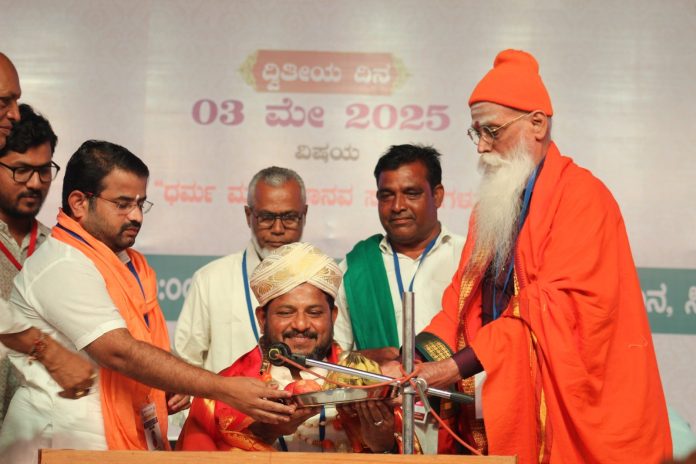– Mohammed Talha Siddi Bapa
Sindhanur, Karnataka: In an era overshadowed by rising communal polarisation and fear-driven narratives, a powerful countercurrent unfolded in the heart of Karnataka. The town of Sindhanur, often seen as a quiet agricultural hub in Raichur district, witnessed a vibrant convergence of faith, ethics, and public harmony during a 3-day Public Qur’an Discourse (Qur’an Pravachana), held from May 2-4 at the RGMS School Grounds.
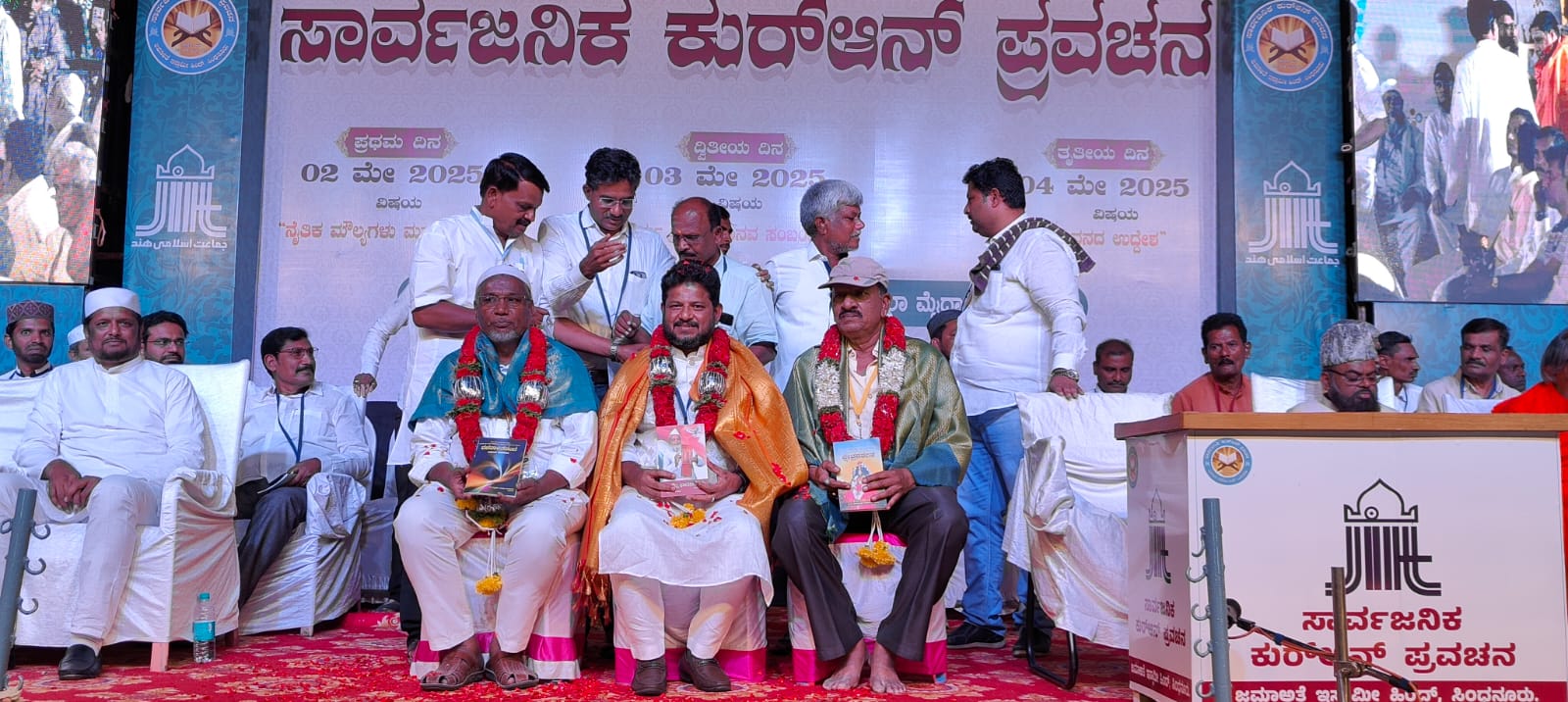 What began as a spiritual initiative by Jamaat-e-Islami Hind Sindhanur soon evolved into a landmark event for interfaith engagement, drawing thousands each day – among them Hindu spiritual leaders, elected representatives, academics, and nearly 40% non-Muslim participants.
What began as a spiritual initiative by Jamaat-e-Islami Hind Sindhanur soon evolved into a landmark event for interfaith engagement, drawing thousands each day – among them Hindu spiritual leaders, elected representatives, academics, and nearly 40% non-Muslim participants.
Qur’an as a Living Moral Voice
At the heart of the discourse was Muhammad Kunhi, an eloquent orator and state secretary of Jamaat-e-Islami Hind Karnataka. Delivering each session in Kannada, Kunhi contextualised Qur’anic teachings to contemporary ethical and civic dilemmas.
On Day 1, he reflected on “Ethical Values and Society” using Surah At-Tin, highlighting the Qur’an’s vision for a society built on human dignity and moral accountability.
Day 2 focused on “Religion and Human Relationships” through Surah Al-Ma’un, offering a compelling view of religion that fuses devotion with social responsibility.
The final session on Day 3 tackled “Purpose of Life” through Surah At-Takathur, inviting attendees to reflect on the transience of material pursuits and the deeper calling of human existence.
Kunhi reminded the audience, “The Qur’an is not a cultural artefact for Muslims alone – it is a message of conscience, justice, and shared humanity.” He stressed that true religiosity lies not in ritual, but in righteous action, and warned against those misusing religion to sow hatred.
When Muhammad Kunhi was delivering his speeches, a literal pin-drop silence filled the grounds. The audience was spellbound – keen, attentive, and visibly moved. Such was the magnetism of the discourse that attendees eagerly invited friends and family to join on subsequent days, resulting in a swelling crowd each evening.
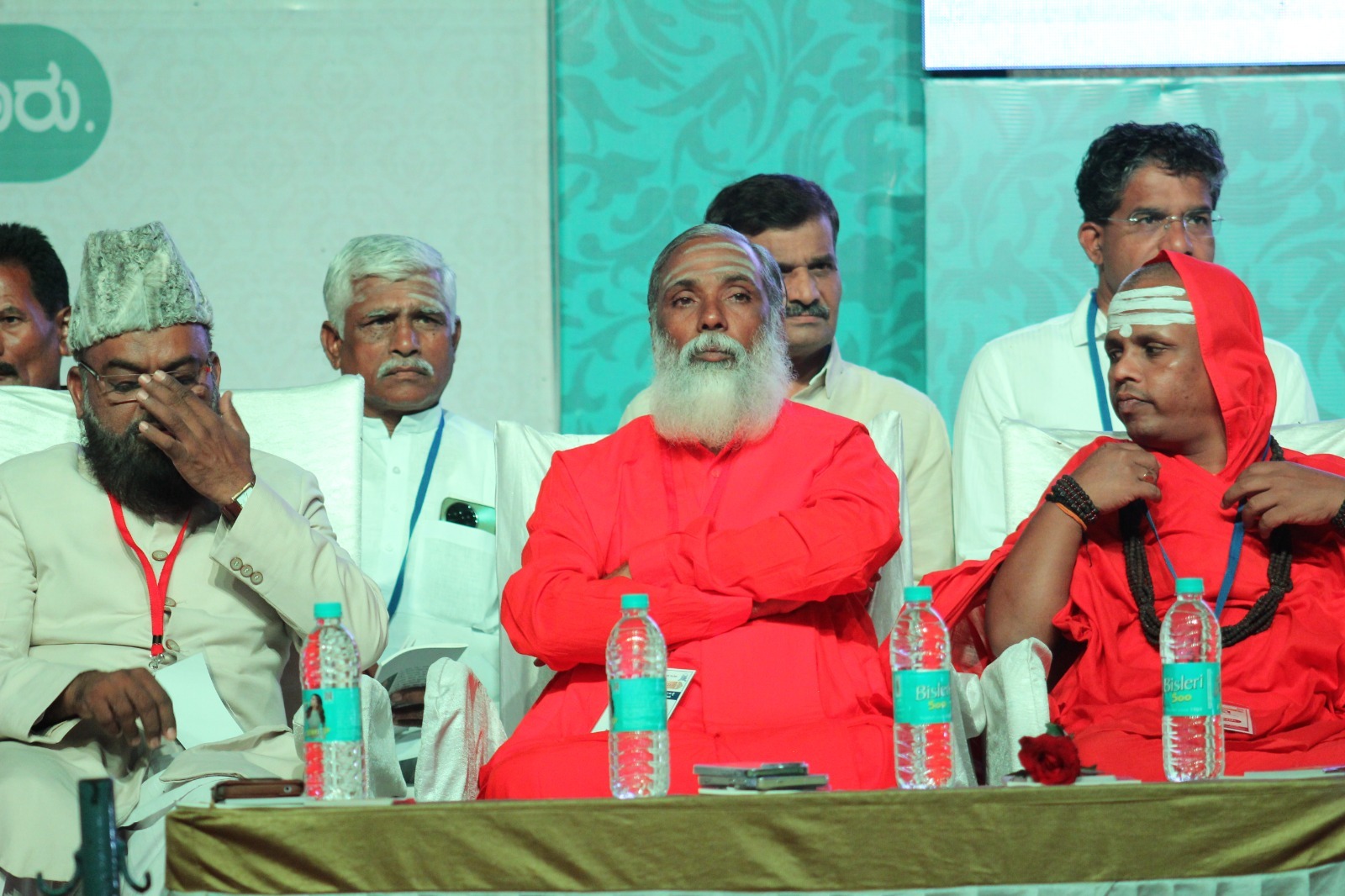 The atmosphere was nothing short of mesmerising. For over an hour, thousands sat in complete immersion, absorbing each word.At the conclusion of each session, the stage would be thronged by people eager to shake hands, express admiration, and capture the moment. Muhammad Kunhi was greeted like a revered public figure – garlands were offered, shawls draped as a mark of respect, and countless selfies taken. It was a rare fusion of spiritual depth and public affection, seldom witnessed at such scale.
The atmosphere was nothing short of mesmerising. For over an hour, thousands sat in complete immersion, absorbing each word.At the conclusion of each session, the stage would be thronged by people eager to shake hands, express admiration, and capture the moment. Muhammad Kunhi was greeted like a revered public figure – garlands were offered, shawls draped as a mark of respect, and countless selfies taken. It was a rare fusion of spiritual depth and public affection, seldom witnessed at such scale.
When Non-Muslims Echo the Message
What set the Sindhanur Qur’an Pravachana apart was the visible and voluntary participation of non-Muslims – not just as audience members, but as organisers, speakers, and supporters.
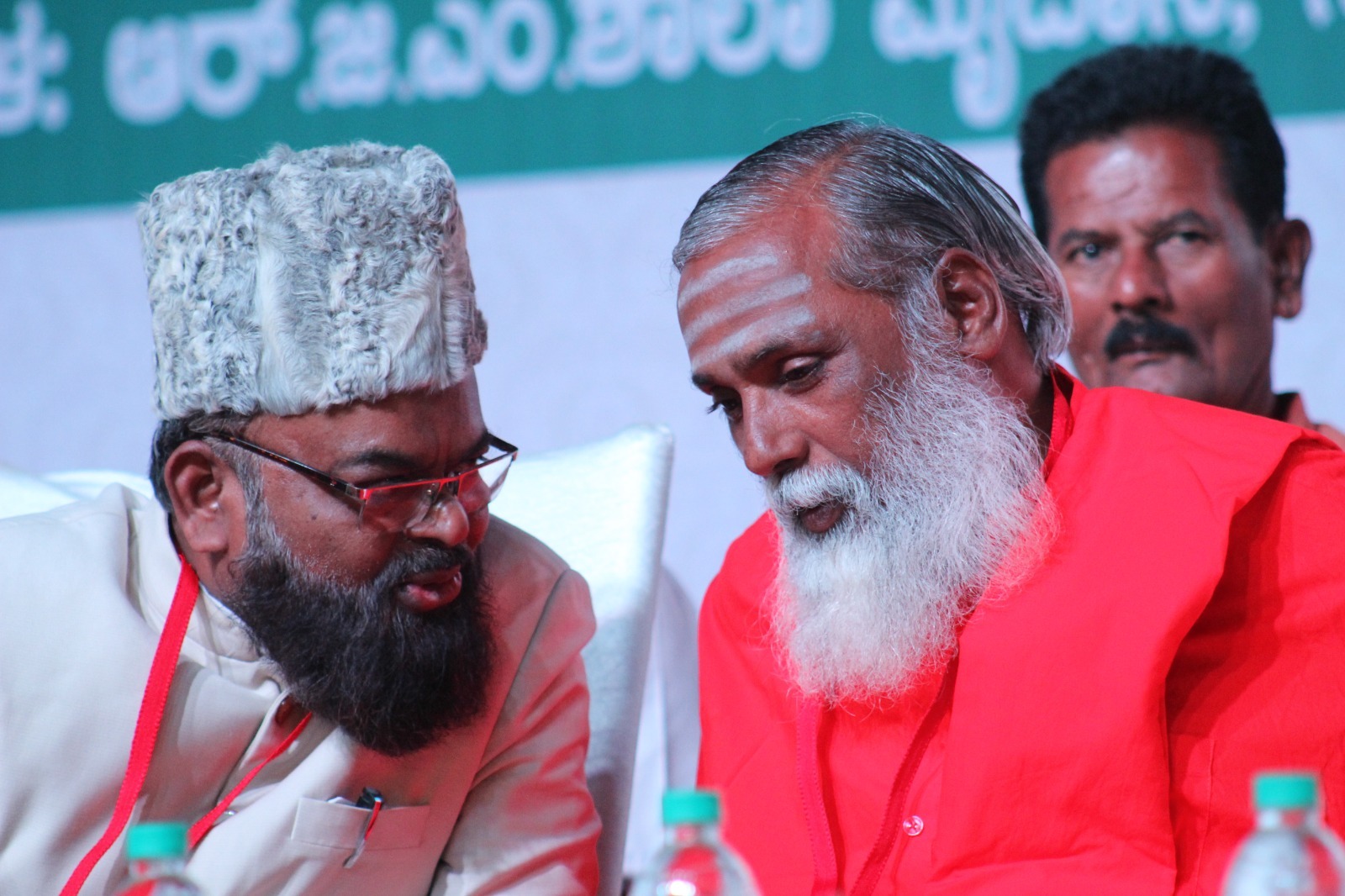 The Reception Committee itself was chaired by the respected social figure Mr. S. Sharane Gowda, who also oversaw daily coordination. At the end of each day, it was non-Muslim guests who delivered vote-of-thanks addresses, symbolising shared ownership of the programme.
The Reception Committee itself was chaired by the respected social figure Mr. S. Sharane Gowda, who also oversaw daily coordination. At the end of each day, it was non-Muslim guests who delivered vote-of-thanks addresses, symbolising shared ownership of the programme.
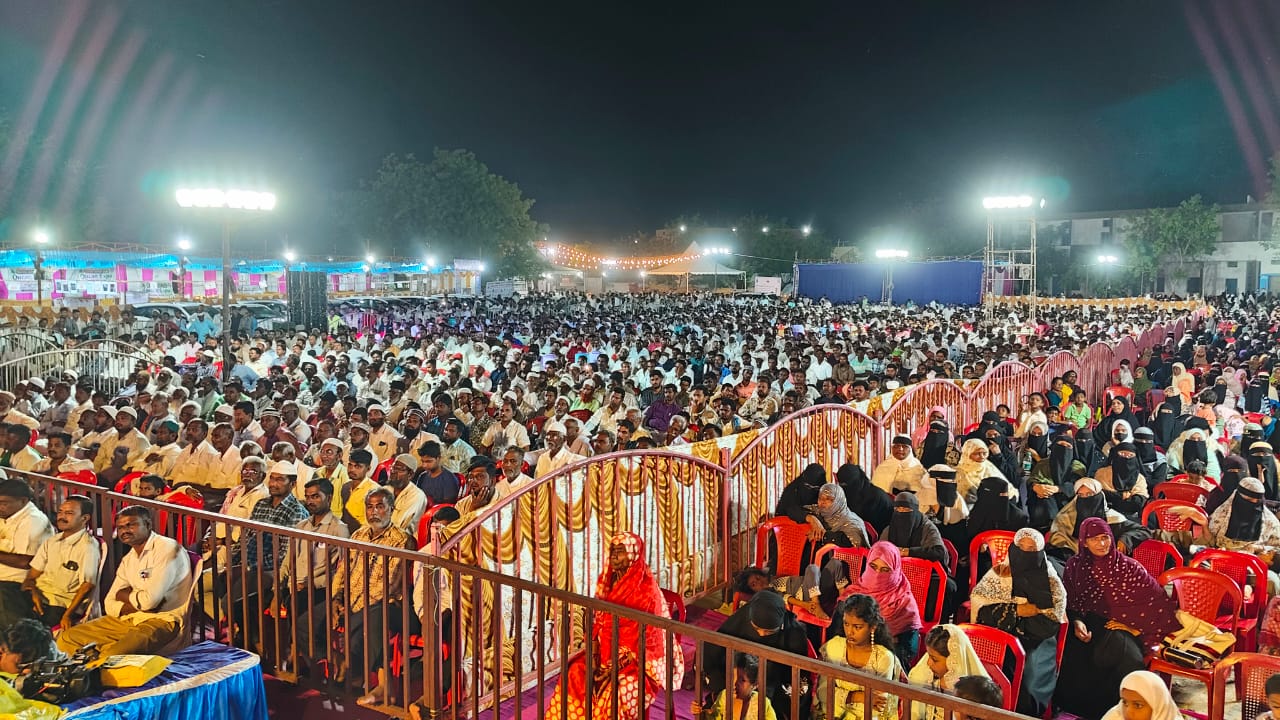 Participants from other faiths openly praised the initiative. “This was not just a religious lecture. It was a human awakening,” said one attendee. Another added, “Listening to the Qur’an in our own language, with practical interpretation, was emotionally moving. Such efforts must happen across the country.”
Participants from other faiths openly praised the initiative. “This was not just a religious lecture. It was a human awakening,” said one attendee. Another added, “Listening to the Qur’an in our own language, with practical interpretation, was emotionally moving. Such efforts must happen across the country.”
Beyond the Lectures: Qur’an Expo Inspires Young Minds
To further connect ethical teachings with civic education, a Qur’an Expo was organised alongside the event. Local schools exhibited posters and models illustrating Islamic teachings on:
– Respect for parents,
– Dignity of women,
– Protection of life,
– Rejection of addiction and violence, and
– Compassion and justice
Jawahar School, Sunshine School, and Iqra Public School won prizes for their creative contributions. Thousands of visitors toured the exhibition, with students receiving certificates and medals. This initiative helped reintroduce Qur’anic ethics as a universal moral framework to a wider public – beyond any single faith.
Breaking Barriers, Bridging Communities
In today’s India, where public religion is often weaponised, the Sindhanur Pravachana did something quiet revolutionary: it opened the sacred to the street, replacing barriers with bridges.
This was not without context. The town has long been known for its living Hindu-Muslim unity – not as a slogan, but as lived reality. The spirit of Sindhanur was on full display: local Hindus and Muslims working hand in hand, sharing meals, hosting guests, and fostering an environment of dignity and mutual trust.
Not Just a Programme – A Process of Social Healing
The scale of participation – 7,000 on Day 1, 8,000 on Day 2, and 12,000 on the final evening – was a testimony to the programme’s magnetic impact. Even the police department and local civic bodies supported the initiative without reservation.
Final Reflections: A Living Model for India
As India grapples with increasing socio-religious divisions, Sindhanur’s Qur’an Pravachana presents a counter-narrative rooted in empathy, clarity, and courage. It shows that:
– The Qur’an, when taught in accessible language with universal values, can win hearts across communities.
Religious discourse, when inclusive and public, can build bridges rather than walls. Local interfaith harmony is not just a distant dream – it is a living truth in towns like Sindhanur. In a strength: the true power of scripture lies not in argument, but in how it is shared – with honesty, care, and a concern for all.


